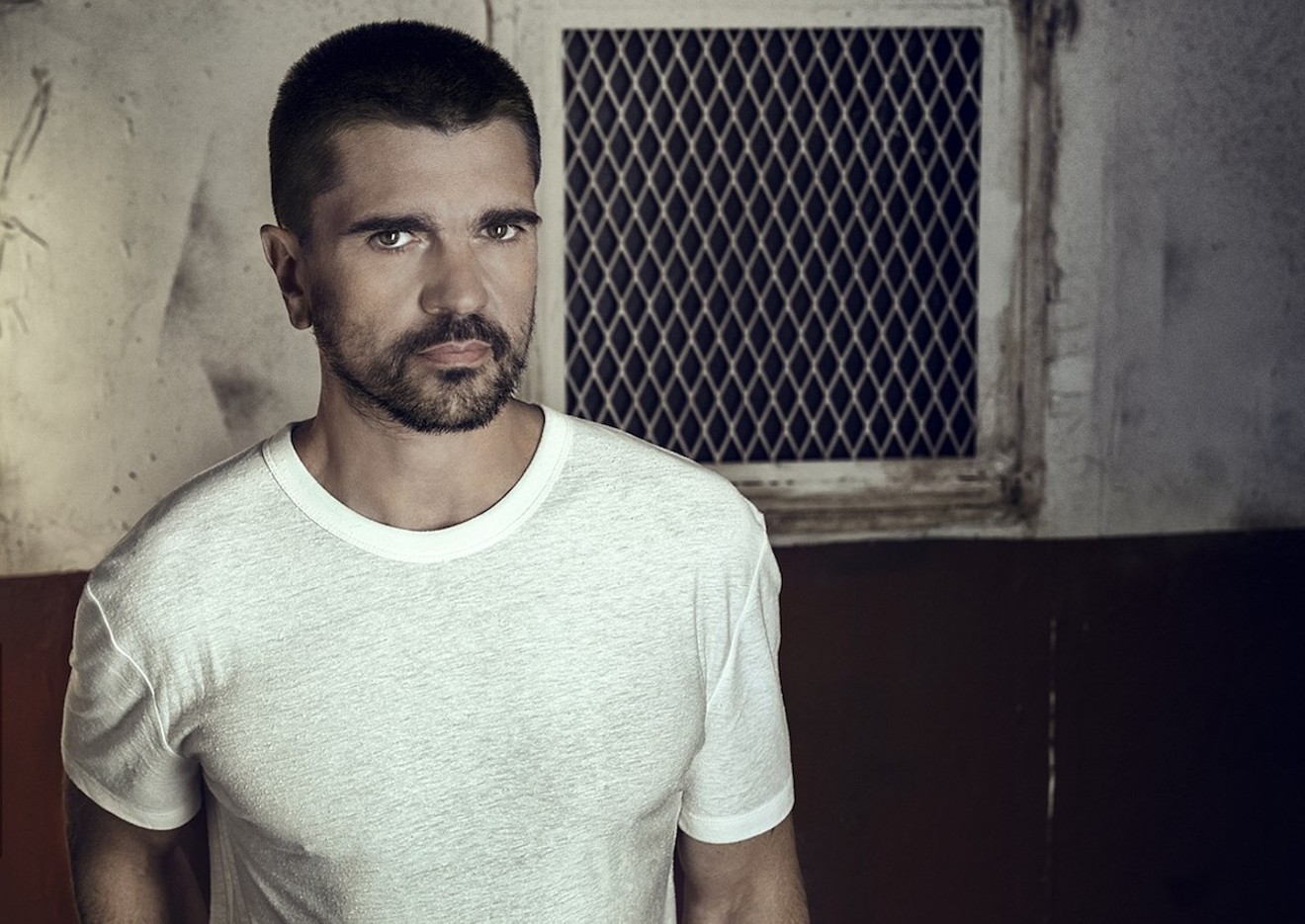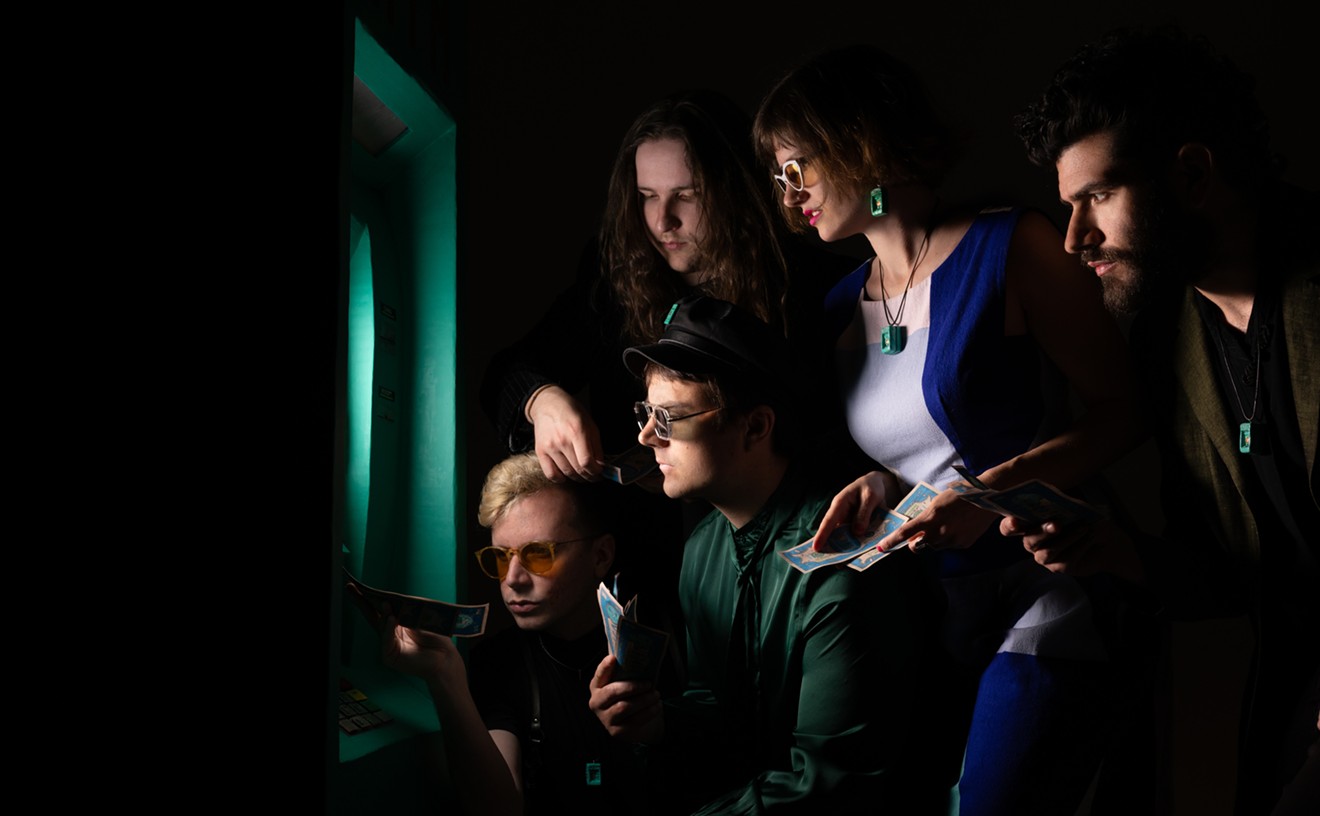Uno, dos, tres, cuatro.
Before he became the Grammy-winning star who counts beats onstage, Juanes counted sheep on his father's hacienda. When the singer born Juan Estebán Aristizábal Vásquez was just a boy, his father, a rancher, would invite him and his five siblings to mount horses and count livestock at the family cottage near Carolina del Príncipe, Colombia, where they would spend vacations.
"I learned to love nature by being so near the fields, the animals, the trees, the plants, and the mountains," he says.
Today Juanes is a Latin music superstar, living in Key Biscayne with his wife and three small children. After winning 20 Latin Grammys and two Grammys and being named among Time's 100 most influential people in the world, the now-44-year-old might have let the fame seep into his head. Or he could have chosen to hang up his guitar, kick off his boots, and relax. Instead, he's yet again revolutionizing Latin music.
This Friday, Juanes, perhaps Miami's best-known Latin singer, will release the first major visual album by a Latin American artist: Mis Planes Son Amarte. The project combines the equivalent of 12 music videos and interspersed dialogue scenes into a cohesive hourlong narrative.
"Singing was my way of connecting, of feeling happy."
tweet this
Juanes could have taken the safe route and made a self-aggrandizing commercial for himself. After all, he has had quite a career. He made history when he traveled to Havana in 2009 and broke from years of
For the audiovisual project, he says, he told the director, Kacho López Mari, he wanted to try acting. "I thought it would be cool to [not] be the singer, but to play a character," Juanes recounts. "I had always liked the idea of acting, but I had never tried it, and I thought I could."
Playing Javier, an archaeologist working in a lab in Mexico, Juanes embarks on a South American expedition. The result fuses Raiders of the Lost Ark with National Treasure and Back to the Future. Waking in a cold sweat, Javier is tormented by dreams and
"Many of the audiovisual's themes relate to me, to the essence of who I am, to what I believe," Juanes says, explaining that he identifies with Javier.
When he was 25 years old, his successful Colombian metal group of 12 years, Ekhymosis, disbanded. Juanes, who was then living in Medellín, sold everything and took a one-way flight to the United States. He went to Los Angeles in the hopes of starting a solo career. "It was like jumping with a parachute without knowing if it would end well or not," he says.
Finally, after three years of sending homemade demos to labels and living on only the cash in his pocket, he was offered a contract with Universal Music Latino. Though he was only 28 years old, his first solo album, Fijate Bien, was showered with seven Grammy nominations — more than most artists can hope for in a career.
What kept him from giving up on his dream when he barely had enough to buy food? "Love for music has always maintained me, ever since I was first in Medellín," he says. "I never thought I wanted to do this to make money or because I wanted to be famous. It was my decision to stay focused and to do this to be happy. And that's why I keep making music."
As a teenager, music was his way of overcoming his social anxieties. He would spend recess at school doing homework to have more time to play guitar at home. "When I was 13, I was way too shy," he says. "I was incapable of speaking to anyone. Singing was my way of connecting, of feeling happy." He had his first taste of performing when his brother invited him to sing with him at school assemblies.
These days, Juanes embraces every moment onstage because he knows what exhaustion feels like. "Six years ago, I was completely drained," he says. "I did not find any sense of being able to enjoy what I most love: music. It was a strange moment, but I was able to reconnect, take time, and find my way."
In 2011, he canceled a tour and took an indefinite hiatus. He closed his email account and spent time reading the Bible, meditating, and working on songs. He completely disconnected from the outside world to reconnect with himself, with God, and with his family.
"What I truly enjoy is time spent with my children, sitting at the table to have lunch with them, going to the movies and to restaurants," he says. "You never forget those moments."
Even during his time off, he never stopped playing the guitar or making music. "It was a pause from the personal pressure and the commitments. I could play guitar without
"Everything that hurt me yesterday/Today makes me more human," Juanes sings on the opening track of Mis Planes Son Amarte. (As of presstime, the title of the song has not been released.) It's an example of the optimism that never seems to leave him, through both personal and political strife.
"When I was 18 years old, I wrote songs with social themes because I felt that is what I needed to say," he says. At that time, Medellín was going through severe political unrest. The title track to Fijate Bien raised awareness about his country's land-mine victims and later led to his creation of the Mi Sangre Foundation for the cause.
Yet for all of his calls for change, Juanes fosters a deep regard for tradition. Since he was 14 years old, he has always worn a rosary around his neck. The one he wears today, a gift from his mother and wife, even appears during onscreen performances. And like his father, Juanes prioritizes spending time with his children. "Much like my father would take us to see his livestock, I have taken my kids to my concerts," he says. "They come with me onstage and backstage."
Juanes knows how to focus on the things that matter. During his shows, he doesn't have a stylist, nor does he change outfits. Instead, he has a tech assistant run to him at impeccably timed cues to take one guitar from his hands and strap another to his shoulder.
That is Juanes. The audience has not finished applauding when he's already reaching for his next project.











